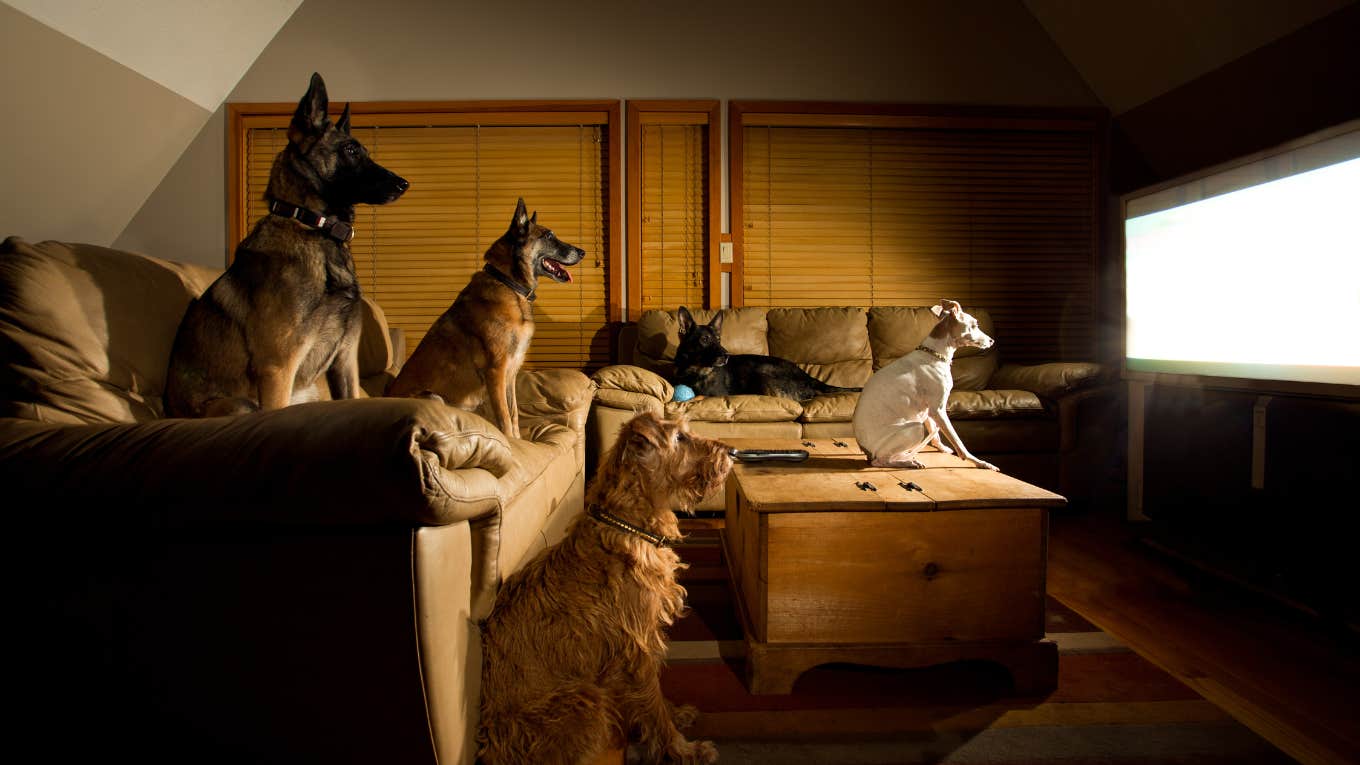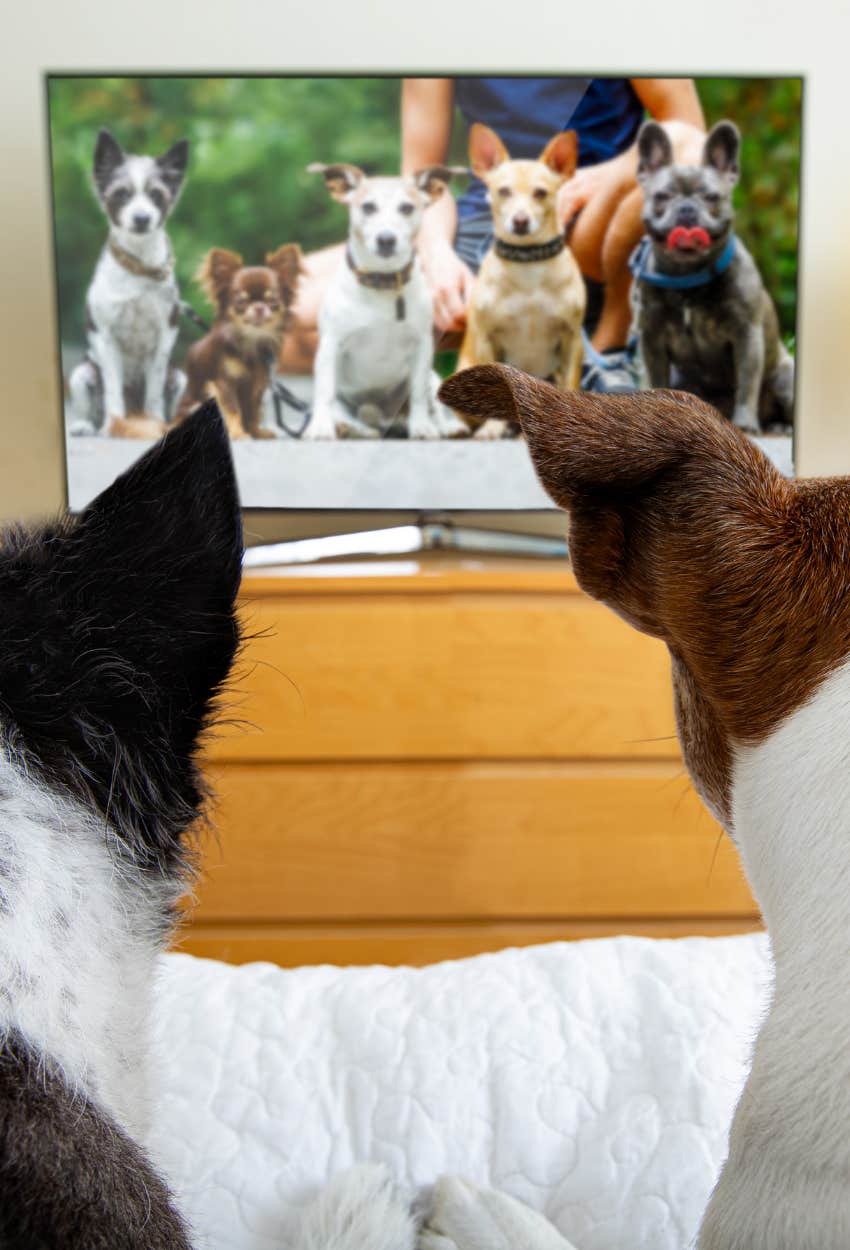Study Finds Dogs Like To Watch TV And Their Favorite Shows Say A Lot About Their Personalities
Turns out your dog is as picky about what's on TV as you are.
 BrianAsmussen | Getty Images Signature | Canva Pro
BrianAsmussen | Getty Images Signature | Canva Pro My best friend has an elderly dachshund who she swears has a favorite radio station. When he's left home alone, he wants the local NPR station on, or he gets very cross, indeed. I've always rolled my eyes at this. Dogs? Having cultural preferences? We're talking about animals who sometimes chase their own tails, let's be serious.
But it turns out, my bestie is vindicated. While her dachshund buddy may be unique in his preference for radio, scientists recently found that dogs generally love to kick back and binge-watch a show or two, and they're just as picky about the shows in question as we are.
A study found that dogs love watching TV and even have favorite shows.
It's often said that dogs and their owners eventually begin to resemble each other, and it seems television is yet another way we mimic each other. Researchers at the University of Alabama recently found that a whopping 88.3% of dogs actively watch TV when their owners are, and they're far more discerning about it than expected.
To measure this, researchers wrangled 453 doggos and observed their behavior and reactions while watching TV. Not only did that huge majority actually watch the goings-on onscreen, but they very clearly had distinct responses to the type of content being shown that revealed actual viewing preferences.
Dogs had three basic responses to TV depending on what the show was about.
Generally speaking, the dogs seemed to break TV content into three basic categories. First, there was programming about other animals, and it will surely come as no surprise to anyone who's seen a dog go crazy about another dog on TV that this type generated the biggest response.
 Damedeeso | Canva Pro
Damedeeso | Canva Pro
Next, there was content featuring objects moving across the screen. The dogs would track the objects as they moved around and often tried to go behind the television set to retrieve an object they perceived as having moved in that direction.
Finally, there was content that made the dogs react cautiously: anything involving other humans or inanimate objects. And the more anxious the dog was, the more cautious they were about what they were seeing unfold on the screen.
Just like us, a dog's temperament and personality seem to determine their TV taste.
Perhaps unsurprisingly, the aforementioned NPR-loving dachshund I know hates the "Real Housewives" franchise. Watching rich women scream at each other may be thrilling for me and my friend, but her dachshund immediately leaves the room the minute the theme tune starts and resumes his favorite activity, napping elsewhere.
Accordingly, the University of Alabama found the dogs in its study had similar personality-driven preferences. Energetic, excitable dogs loved watching stuff with objects they could track, like sports or shows with animals running around.
Anxious or fearful dogs, on the other hand, like quieter, calmer programming that doesn't have a lot of noises like doorbells or car alarms. They're more your "Masterpiece Theater" types, if you will.
And interestingly, other characteristics like age, gender, or previous TV exposure didn't seem to have much impact on their viewing preferences, suggesting it's more an issue of nature than nurture.
Researchers say this data can help owners and caretakers make better decisions about training issues — such as when a dog constantly barks at every noise coming from the screen — and what kind of content to choose in environments like shelters, where TV is often used as an enrichment activity for dogs.
They didn't specify how to get your high-brow NPR dog to watch Kyle and Dorit have their 87th fight about text messages on "The Real Housewives of Beverly Hills," however. Sometimes you just gotta let sleeping dogs lie.
John Sundholm is a writer, editor, and video personality with 20 years of experience in media and entertainment. He covers culture, mental health, and human interest topics.

